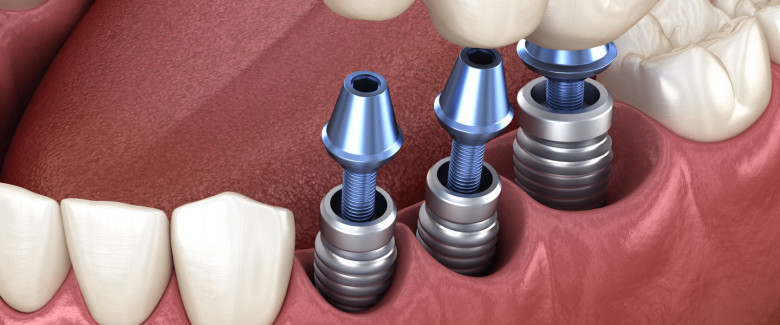views
Caring for Dental Implants with Regular Check-Ups
Dental implants have transformed countless smiles, offering a long-lasting solution for missing teeth and significantly enhancing oral functionality. Unlike dentures, implants integrate with the jawbone, providing superior stability and a more natural feel. However, while they are designed to be durable, they are not invincible. The health and longevity of dental implants rely heavily on continuous care.
One of the most vital components of implant maintenance is attending regular dental check-ups. These visits help ensure that any potential issues are detected early, and necessary interventions are made promptly. By working closely with a professional, individuals can maximise the lifespan of their implants and enjoy a confident, healthy smile for years to come.
Understanding Dental Implants
Dental implants are a sophisticated restorative solution designed to replicate the structure and function of natural teeth. Each implant typically consists of three main components:
- Implant Post: A titanium screw embedded into the jawbone, acting as an artificial root.
- Abutment: A connector placed on top of the implant post.
- Crown: The visible tooth replacement attached to the abutment.
The process involves a surgical procedure where the implant post is placed into the jawbone, allowing it to integrate naturally over time through a process called osseointegration. Once healed, the implant provides a solid foundation for the custom-made crown, resulting in a restoration that looks and functions like a natural tooth.
People often choose dental implants due to their durability, natural appearance, and ability to preserve jawbone density. Unlike traditional dentures, implants help maintain the bone structure, preventing the facial sagging associated with tooth loss. However, this long-term success is achievable only with vigilant care and regular visits to a qualified dental professional, such as a private dentist in Cardiff.

Why Maintenance is Essential for Dental Implants
While dental implants are resistant to decay, they are not immune to gum disease and other oral health complications. One of the most significant threats to implant longevity is peri-implantitis, a condition characterised by inflammation of the gum and bone surrounding the implant. If untreated, it can lead to implant failure.
Regular maintenance helps in:
- Preventing Infection: Plaque and tartar buildup around the implant can trigger inflammation.
- Maintaining Gum Health: Healthy gums are essential for implant stability.
- Preserving Bone Integrity: Regular monitoring ensures early detection of bone loss.
Neglecting maintenance can turn a successful implant into a costly failure. Therefore, ongoing professional supervision is vital to safeguard the investment made in dental implants Cardiff.
Role of Regular Dentist Visits in Implant Care
Routine dental appointments play an instrumental role in the health of dental implants. These visits allow dentists to perform specialised cleaning techniques that remove plaque and tartar deposits around the implant without damaging the surface.
Key benefits of regular visits include:
- Professional Cleaning: Unlike natural teeth, implants require specific tools and techniques for cleaning to avoid scratching the implant surface.
- Early Detection of Problems: Regular examinations can uncover issues like gum inflammation or early bone loss before they escalate.
- Adjustments: Over time, bite forces can change, placing undue stress on implants. A dentist can make adjustments to crowns to ensure even bite distribution.
Moreover, a private dentist in Cardiff often has access to advanced diagnostic tools and technologies that aid in the precise monitoring and maintenance of dental implants.
Frequency of Dental Visits After Implant Placement
The general recommendation for dental visits after implant placement is at least twice a year. However, some individuals may require more frequent visits depending on specific risk factors such as:
- Smoking: Increases the risk of implant complications.
- Diabetes: Affects healing and infection resistance.
- History of Periodontal Disease: Higher risk of developing peri-implantitis.
Dentists often customise recall intervals based on the patient's individual needs, ensuring that both the implant and overall oral health are preserved optimally.
What Happens During an Implant Check-Up?
Implant maintenance visits are comprehensive and go beyond the routine checks performed on natural teeth.
Typical steps include:
- Clinical Examination: Dentists check the gums for signs of redness, swelling, or bleeding around the implant.
- Probing Depth Measurements: Measures the depth of the gum pockets around the implant.
- Radiographic Evaluation: X-rays are taken to monitor bone levels around the implant.
- Scaling and Polishing: Special instruments are used to clean the implant surface gently.
By performing these assessments, dentists ensure that implants remain stable and free of infection, providing the foundation for a healthy, confident smile.
At-Home Care vs Professional Care
Daily oral hygiene is indispensable for implant maintenance. Individuals must:
- Brush twice daily using a soft-bristled toothbrush.
- Floss carefully around the implant crown.
- Use interdental brushes or water flossers to clean hard-to-reach areas.
- Rinse with an antimicrobial mouthwash.
However, even the most diligent at-home care cannot substitute professional intervention. Some plaque and tartar deposits can become hardened and impossible to remove with regular brushing. Additionally, patients may not notice early signs of complications that a trained dental professional would quickly identify.
Thus, maintaining a partnership with a private dentist Cardiff ensures that both daily efforts and professional expertise work together to secure implant health.
Choosing the Right Dentist for Implant Maintenance
Selecting the right dental professional is crucial for ensuring the longevity of dental implants. Not every dentist specialises in implant maintenance, making it vital to choose carefully.
Factors to consider include:
- Specialised Training: Dentists with expertise in implantology can detect and manage complications more effectively.
- State-of-the-Art Equipment: Advanced diagnostic tools improve care accuracy.
- Continuity of Care: Long-term relationship with a dental provider ensures better monitoring over time.
Opting for a private dentist Cardiff often offers greater flexibility, personalisation of care, and access to specialised implant services not always available through public healthcare.

Conclusion
Dental implants offer a second chance at a full, vibrant smile, but their success depends heavily on continuous care. Regular visits to a qualified dentist are not just a recommendation but a necessity for protecting your investment in dental implants Cardiff. From professional cleanings to early problem detection, these appointments serve as the backbone of effective implant maintenance.
Choosing a trusted private dentist Cardiff ensures that your implants receive the highest standard of care tailored to your specific needs. Remember, your smile is worth preserving, and with consistent professional support, you can enjoy the benefits of your dental implants for many years to come.
For expert care that prioritises your smile's health and longevity, trust Super Smile Dental to guide you every step of the way.



Comments
0 comment